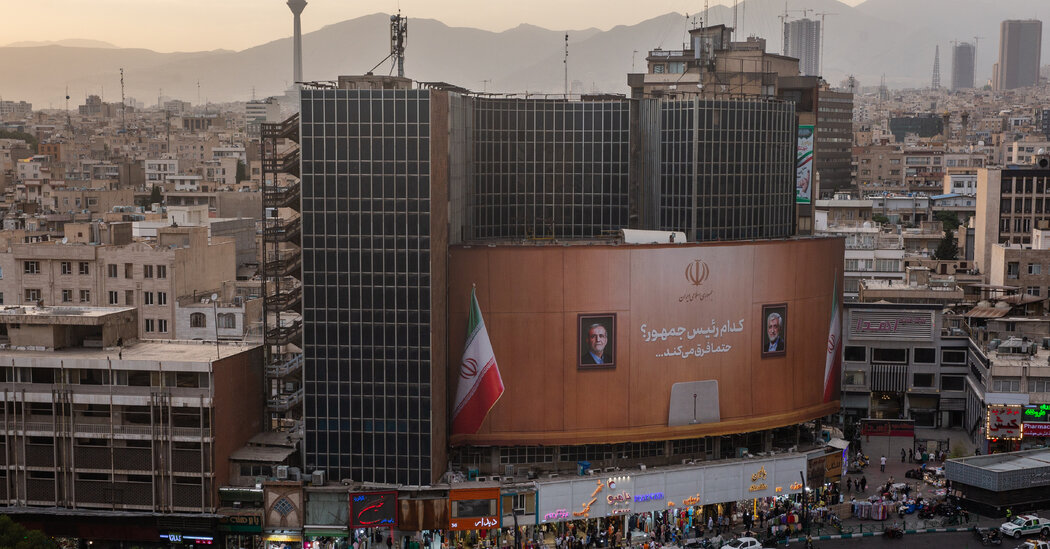Two candidates, a reformist and an ultraconservative, will face off in Iran’s runoff presidential election on Friday, amid record-low voter turnout and overarching apathy that meaningful change could happen through the ballot box.
The runoff election follows a special vote held after President Ebrahim Raisi’s death in a helicopter crash in May.
What happened in Iran’s first-round vote?
About 40 percent of voters, a record low, went to the polls last Friday, and none of the four candidates on the ballot garnered the 50 percent of votes needed to win the election.
The reformist candidate, Dr. Masoud Pezeshkian, a former health minister, and Saeed Jalili, an ultra-hard-liner and former nuclear negotiator, received the most votes, sending the election into a runoff round on Friday.
Dr. Pezeshkian advanced because the conservative vote was split between two candidates, with one receiving fewer than 1 percent.
The runoff may have a slightly larger turnout. Some Iranians said on social media that they feared Mr. Jalili’s hard-line policies and would vote for Dr. Pezeshkian. Polls show that about half of the votes for Mr. Jalili’s conservative rival in the first round, Mohammad Baqer Ghalibaf, have been redirected to Dr. Pezeshkian.
Who are the two candidates in the runoff?
Experts said Dr. Pezeshkian was most likely to increase voter turnout among reformist party supporters and people who boycotted the parliamentary elections in March and the presidential election in 2021. Dr. Pezeshkian has said he would engage with the West in nuclear negotiations to lift the tough economic sanctions that are plaguing Iran’s economy.
On the other hand, Mr. Jalili has a much tougher position on negotiations and has said in debates that he plans to defeat sanctions and strengthen economic ties with other countries.
Iran’s nuclear policies and major state policies are decided by the supreme leader, Ayatollah Ali Khamenei. He has given the greenlight for the government to engage indirectly with the United States to lift sanctions. Those negotiations are likely to continue regardless of who is the president.
Will Iranians show up to vote?
Though Iranians have historically been extremely engaged in elections, many have refrained from voting in recent elections to protest a government they view as inept and out of touch with their demands. Many no longer believe that voting will make a difference in their lives and have called for the end of clerical rule.
Mr. Ghalibaf asked his supporters to vote for Mr. Jalili in the runoff, but many of his supporters, including some of his campaign managers, have defected to Dr. Pezeshkian’s camp, saying Mr. Jalili was destructive to Iran’s future and would increase tensions domestically and internationally.
Iranians turned out to vote in the presidential election in 2013 for the reformist candidate Hassan Rouhani, whose campaign pledges included a more open country and fewer social restrictions. President Donald J. Trump effectively ended hopes of cooperation in 2018 by withdrawing from a nuclear deal with Iran and reimposing sanctions.
When the conservative Mr. Raisi succeeded Mr. Rouhani, the prospects for improving social freedoms diminished.
Is this election free and fair?
The Guardian Council, a 12-person group of jurists and clerics, has been accused by many human rights organizations of manipulating elections by removing the public’s ability to select which candidates run. It whittled a list of 80 candidates down to six for this election, disqualifying seven women, a former president and many government officials.
Why is this election important?
The election is an opportunity for the government to show it can handle a president’s unexpected death without falling into disarray amid internal protests against the Islamic Republic and tension with the United States and Israel.
If Mr. Jalili is elected, the government will most likely claim a victory for its brand of ideologically driven politics.
While the supreme leader is the country’s ultimate authority and is responsible for foreign policy, the president sets domestic policy and can influence social issues like Iran’s mandatory hijab law for women.
Six years after the United States withdrew from its nuclear deal with Iran, the new president’s role in the management of the nuclear program is unclear. The issue that has become increasingly pressing for the West as tensions escalate between Israel and Iran.
What are the main issues?
The spluttering economy, sanctions led by the United States and women’s rights are major issues in this election, as many Iranians have lost trust in a government they believe is incapable of enacting change.
Sanctions have debilitated the country’s already struggling economy. Public frustration has increased as some perceive a disconnect between leaders preaching austerity and modesty while their families spend lavishly abroad.
When will the runoff results be known?
The Interior Ministry announced a runoff election the day after voting ended in the first round. Officials will most likely release at least preliminary results by Saturday.
